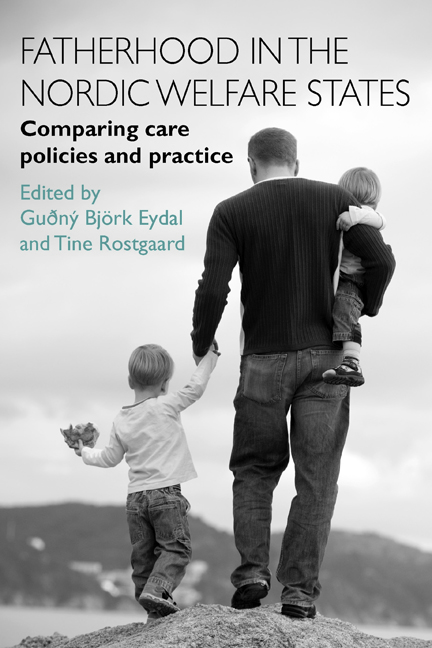Book contents
- Frontmatter
- Contents
- List of tables and figures
- Notes on contributors
- Acknowledgements
- one Introduction
- Theme 1 Fathers, families and family policies
- Theme 2 Fathers in everyday life – culture, work and care
- Theme 3 Constructing fatherhood in different family settings
- Theme 4 Caring fathers and paid parental leave policies
- Theme 5 International reflections on findings
- Conclusions
- Index
eleven - Making space for fatherhood in gay men’s lives in Norway
Published online by Cambridge University Press: 04 March 2022
- Frontmatter
- Contents
- List of tables and figures
- Notes on contributors
- Acknowledgements
- one Introduction
- Theme 1 Fathers, families and family policies
- Theme 2 Fathers in everyday life – culture, work and care
- Theme 3 Constructing fatherhood in different family settings
- Theme 4 Caring fathers and paid parental leave policies
- Theme 5 International reflections on findings
- Conclusions
- Index
Summary
Introduction
The chapters in this book provide evidence as to how the construction of fatherhood is undergoing changes as a result of closer and more independent relations between fathers and children. This also affects gay men and their prospects for and realisation of fatherhood. Norms pertaining to fatherhood (and parenthood) are changing along with the political struggle among gays and lesbians for greater acceptance and recognition, including parenthood. What insight can the experiences of homosexual men who choose to be fathers bring to the understanding of these changes in fatherhood norms, roles and relations? This chapter is based on a study of homosexual men from the Norwegian middle class who have had children with a lesbian friend. The central question for this study is how these fathers establish their fatherhood in light of the child being born outside of the traditional frame of a heterosexual couple in a shared home. The chapter applies an understanding of the importance of space to the analysis of fatherhood. By focusing on the spatial dimensions of home and parenthood, a theoretical perspective is established that differs from a tradition in family sociology where the focus is more on social interaction but not on how this interaction also contributes to the construction of space.
The central question is divided into two sub-questions. The first concerns the importance of the child for how the fathers construct a space for their fatherhood. The second concerns how the fathers establish a position of fatherhood in a situation where the child already has several parenting figures to relate to: a mother, a co-mother and often also a co-father. The study shows that the ‘space’ of parental collaboration takes the place that a shared parental home traditionally occupies. One important finding is that although the fathers choose to have children in an unconventional manner, the space of collaboration which they establish with the mothers serves to confirm conventional values and traditional family relations. In this manner, these fathers contribute to continuity in conceptions about family and home. The analysis of the spatial dimension of fatherhood is carried out in two stages: first, how fathers shape their own home into a space that includes their child; second, how the fathers collaborate with the mothers (and co-mothers) to create a common social space for the child in two separated homes.
- Type
- Chapter
- Information
- Fatherhood in the Nordic Welfare StatesComparing Care Policies and Practice, pp. 231 - 250Publisher: Bristol University PressPrint publication year: 2014



